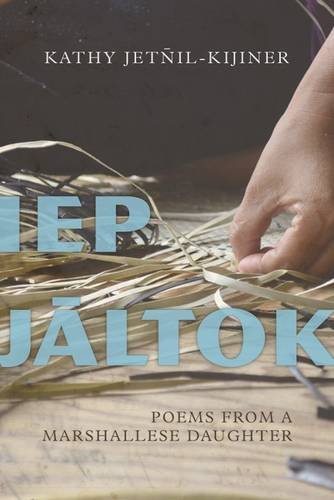Recently I was asked by two former poetry mentors of mine to be interviewed for their research. Their research focused on the art of spoken word in the Pacific, with an emphasis on the organization that I count myself a part of – Pacific Tongues. One of the questions they asked struck me. They basically asked what are some of my ideas on how we could get Pacific youth to incorporate their identity and their culture into their writing.
I had a pretty straightforward answer: anything and everything these youth write will be representative of their culture and identity. They could write about walking down the street, attending a kemem, flunking out of school, fishing with their father, spraying graffiti across the underbelly of the bridge, giving birth to their first son – all of these will represent facets of their identity as Pacific youth. What many Pacific writers and scholars have argued and demonstrated through their own art and research is that there is no one way to be “Pacific.” There is so much more to our identities than the coconut trees ocean navigation canoes and tourist destination (although those are integral factors for sure).
It always bothers me when people try to create such a tight confined box for what it means to be an islander – what it means to be Marshallese or Samoan or Hawaiian. More and more of our youth are growing up and living outside of their islands – but that doesn’t mean their identity is any less Pacific than their cousins living in their homelands. That doesn’t mean they aren’t riding along subways with the awareness of their mothertongue tucked neatly into their pockets, singing traditional songs while drinking a 40 and strumming ukuleles over a freeway. This awareness of the self, the homeland, the culture, the family. It will always be there. It never disappears. I’m speaking from years of experience.
Since going to the United Nations, I’ve been asked to join multiple campaigns on climate change. And I have no problem joining forces, lending my support in whatever way I can because hey – it’s for the cause. Whatever will wake people up to save my islands.
However, I’ve also been worried that I’ve been pigeonholed into an expectation that everything I will write about from here on out will be climate change related. That I will become “The Climate Change poet.” Nothing wrong with that, but here’s the thing: there’s more to my islands than the threat of being drowned.
This isn’t to downplay the divestment campaign from my past post – I still believe strongly in this movement (there’s actually still quite a bit more work planned in that department – stay tuned). And I also still strongly support every effort for climate activism. I will always feel a strong sense of responsibility to do everything I can to raise awareness.
But it did feel like I freed myself a bit, at least creatively, when I answered the question so assuredly. “Everything these youth write will be Pacific literature,” I had said, without even pausing to think. And in the same strand, everything I write will be Pacific literature. Because each of us are living breathing writing pacific literature.

Well expressed, Keep on being true to your voice. Thanks for sharing a peek into another world, and yet a similar world in our common human yearnings and challenges. blessings, Brad
At age 55 I was a volunteer college instructor in Micronesia. My twenty-something counterparts liked weekends. Go here! See this! Hike and camp with us! they told me. You are missing the island experience. Everything I do, I replied, is the island experience. Do you really think this is the industrial mid-west of the States?
Love this. So true. I am reminded of Chimamanda Adichie’s #DangerOfTheSingleStory. There is a multitude of diverse ways to “be” Pasifika and write Pasifika stories. We need more of us writing, creating and sharing stories.
Yes, we have to recognise people have so many ways of being in the world. I will always be a writer not a dancer, and although I love that my mum does traditional dance and craft, she has accepted that I love being a poet. You can check out my Magic Fish Dreaming project if you like. I am about to kick off!
I’m so in love with this. I live in Aotearoa where we have so many pacific islander students who feel they’re not “allowed” to relate to being an islander because there’s a tight confined box of what makes you islander. But you’ve said it, and I agree with every word.
Fa’afetai lava